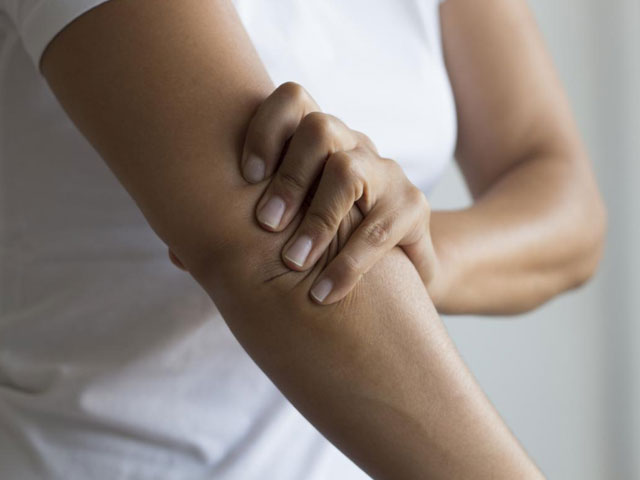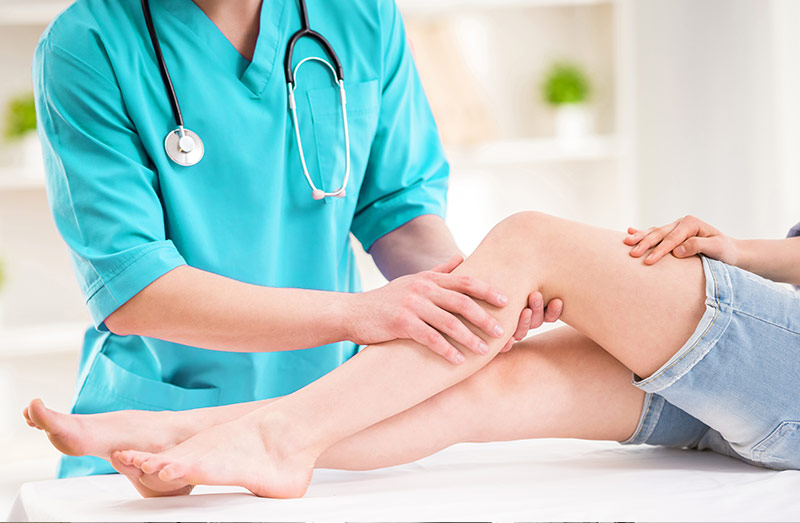Stiff joints are indicators of old age, injury or some other underlying problems. Joint stiffness may be mild, that affects your mobility for a brief period of time each morning or severe that keeps you immobile for hours. Sitting or lying down for several hours may reduce fluid amounts in your joints, resulting in stiffness.

While many people experience stiff joints just after waking up or getting up, in some cases, there is severe pain throughout the day. Apart from the stiffness, inflammation and pain in the joints while walking, standing, or even sitting makes life very difficult.
While age is mostly the cause of stiff joints, the cause may also include severe conditions like arthritis, lupus, and bursitis. In addition lifestyle factors, including diet and weight, also impact joint mobility.
Go through the blog to know more about possible causes and treatments.
Possible cause #1: Rheumatoid arthritis (RA)
Rheumatoid arthritis (RA) is one of the most common forms of arthritis that is the cause of severe joint stiffness. The chronic inflammatory disorder is an autoimmune disease. The disorder causes the immune system to attack the healthy parts of your body, especially the lining of your joints which results in inflammation, pain, and stiffness. Eventually, it may cause joint deformity and bone erosion.
Symptoms typically appear between ages 30 and 60. There is no cure that eliminates the disorder entirely but if detected in early stages can be managed through medication and other treatments.
Possible cause #2: Osteoarthritis (OA)
Moving on to another major cause of joint stiffness, another form of arthritis, osteoarthritis (OA), also called degenerative arthritis is one of the major causes. This category of arthritis results from wear and tear on your joints, a side effect of advancing age. When the cartilage, the thin tissue that protects the bones in your joints, wears away with use, mostly with age, it results in stiffness, inflammation, pain and even crackling sounds when the joint is in motion.
Furthermore, when the condition worsens, it can be the cause of bones to break more easily, further resulting in developing bone spurs. Also, it has been noted that the cartilage disappears in the advanced stages of OA. Severe pain, stiffness and disability are the side effects when bones rub against other bones in your joint.
While the treatment for OA can help replace some of the lost cartilage and fluid in your joints, the condition requires lifestyle changes. Reducing weight and pressure on joints is mostly effective too, but in most of the severe cases, joint replacement surgery is necessary.
Possible cause #3: Lupus
Another cause of joint stiffness is, an autoimmune disease, Lupus. The disease makes your body attack itself, including your organs and tissues. The entire body, and especially the joints undergo not just stiffness causing mobility problems but also severe pain and swelling.
The symptoms are quite similar to many other conditions, therefore makes Lupus quite difficult to diagnose. In fact, it may take several months for a lupus diagnosis after tests rule out other conditions.
A chronic disorder, it has no cure. The symptoms of the condition stay for the rest of your life, though there are treatments that control and reduce symptoms.
Possible cause #4: Bursitis
Moving on, another possible cause of stiffness in joints is Bursitis. Bursae are the tiny fluid-filled sacs that cushion the bones, ligaments, and muscles in your joints. In the event that these sacs become inflamed, this condition will result in stiffness and pain in the affected joint.
Bursitis affects mostly in the elbow, shoulder, hip, knee, ankle and also big toe. The condition is mostly temporary, and the treatment relies on resting the affected joint. Reducing physical activity and keep the joint stationary for periods of time, allows the bursae to recover and stiffness to resolve.
Possible cause #5: Gout
Another type of arthritis, gout is a cause of stiffness in joints. Unlike the other possible causes, gout is a sudden disorder. It may even appear while you are asleep, sitting or even walking about. These make joints painful especially when you wake up.
The typical characteristic of gout are the severe, sudden episodes of pain and tenderness in joints, any of the joints. The first indicator of the condition is pain and immobility in the big toe. The symptoms are treatable but one has to deal with the condition for the rest of their life.
Research states that Gout is a type of arthritis, which affects men more often than women. The risk for woman to develop gout increases mostly after menopause.
Possible cause #6: Bone cancer
Rare but a possible cause, bone cancer may result in stiffness in joints and pain. Not everyone diagnosed with the disease will have pain. Nor does it in any way indicate the disease. Cancer is treatable, but depends on several factors that include the size, location, and type of tumor.
How to find relief for Stiff Joints
To get relief from joint stiffness, the best way is to find the cause. If it’s physical hard work, age or injury then the best treatment is rest, painkillers and exercise. If the stiffness lasts longer than 30 minutes after you wake up or if symptoms are getting worse, medical attention is necessary.
Hot or cold compress
Both temperature extremes in the form of hot and cold compress may be beneficial for stiff joints. Applying a cold compress to your stiff joint for 15 to 20 minutes several times a day can help ease the joint into movement. The cold also dulls pain receptors so that you can be relieved of throbbing pain.
Heat is also equally therapeutic to stiff joints. It help relax muscles, increase circulation and aid the joints move. Use a heating pad, hot water bottle, or warm water from a shower or bath.
Over-the-counter (OTC) medication
OTC medicines, non-steroidal anti-inflammatory drugs (NSAIDs) are immediate remedies to your joint pains. Some commonly used for NSAIDs include aspirin, ibuprofen, and naproxen. The medications though available easily must not be used frequently. If pain persists, a visit to the doctor is prescribed.
Exercise
Exercise and physical therapy help to increase joint mobility, which in turn can reduce stiffness. Another reason why it is helpful for cure joint stiffness is, exercise helps to lose weight and also maintain a healthy weight.
Exercising needs proper guidance to help you achieve results. Consult your doctor or a trained physical therapist. Exercise is an easy way to relieve pain and stiffness, but if precautions are not taken then will only aggravate certain conditions if you don’t take precautions before beginning an exercise plan.
Natural remedies for pain relief
There are a number of complementary and alternative medicine treatments that hold some promise for easing stiff joints. Check them out below.
- Fish oil supplements
A study has found fish oil consumption results in fewer episodes of morning joint stiffness and pain. Unsaturated fats eicosapentaenoic acid (EPA) and docosahexaenoic acid (DHA) are easily found in a typical dosage for fish oil supplements. The most common dosage is 300 milligrams (mg) per day.
Consult your doctor before you begin taking fish oil supplements or determine the dosage as it can interfere with other medications. Adding fish dishes to your meals will help too, as they contain omega-3 fatty acids.
- Flaxseed
A natural remedy associated with cure of joint stiffness is, Flaxseed. Containing another type of omega-3 fatty acid, alpha-linolenic acid (ALA), flaxseed may help reduce inflammation and ease symptoms of joint stiffness.
Grounded powder have some benefits, but flaxseed oil has more. The recommended average daily dosage is 500 mg.
- Glucosamine sulfate
Occurring naturally in the fluid around your joints, this chemical plays a role in producing cartilage. If you have a glucosamine sulfate deficiency, you cartilage surrounding joints are at stake.
There are also research supports that use this supplement for relieving joint pain and stiffness. The recommended dosage for arthritis pain ranges from 300 to 2000 mg per day. Its best to consult a doctor to determine a dosage so that does not affect other medications.
When to consult the doctor for stiffness in joints
If stiffness and pain in joints don’t resolve after a period of five to seven days, its time you should seek medical attention.
If you experience any of these symptoms, then you must not wait to get help:
- severe pain
- rapid swelling
- joint deformity
- inability to move the joint
- intense redness and hot to the touch
[Also read about Orthopedics Surgery in India]
